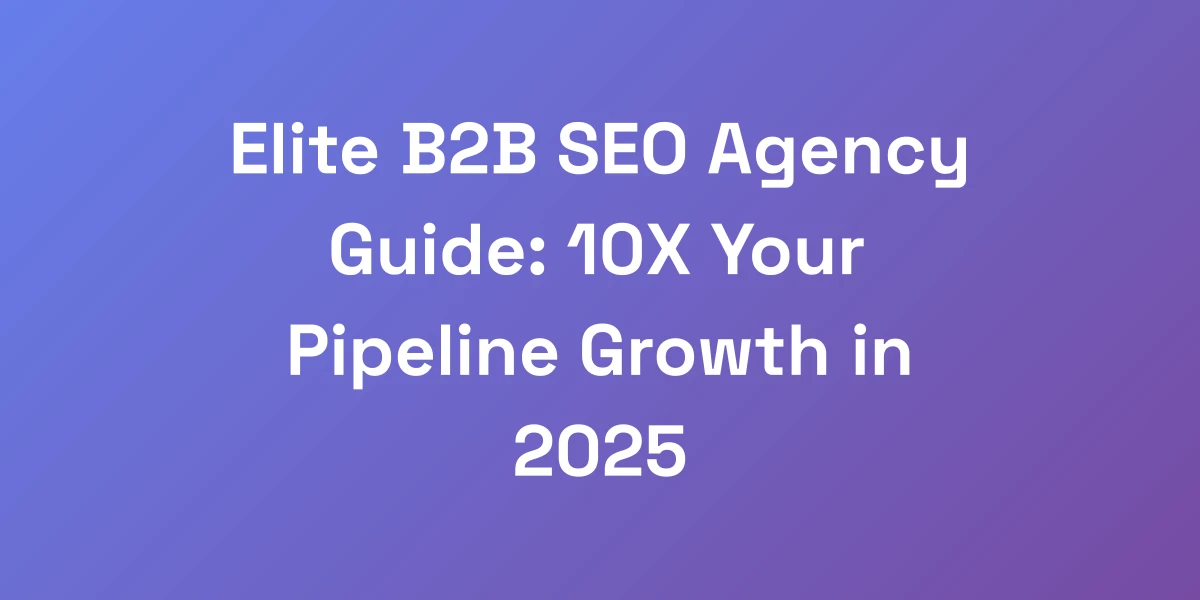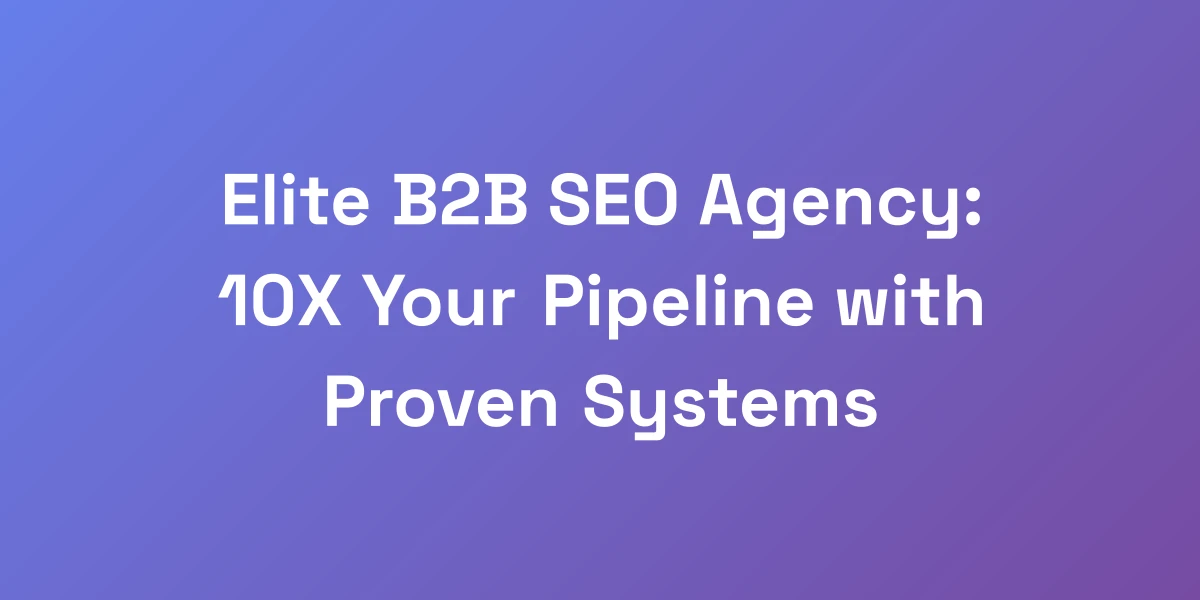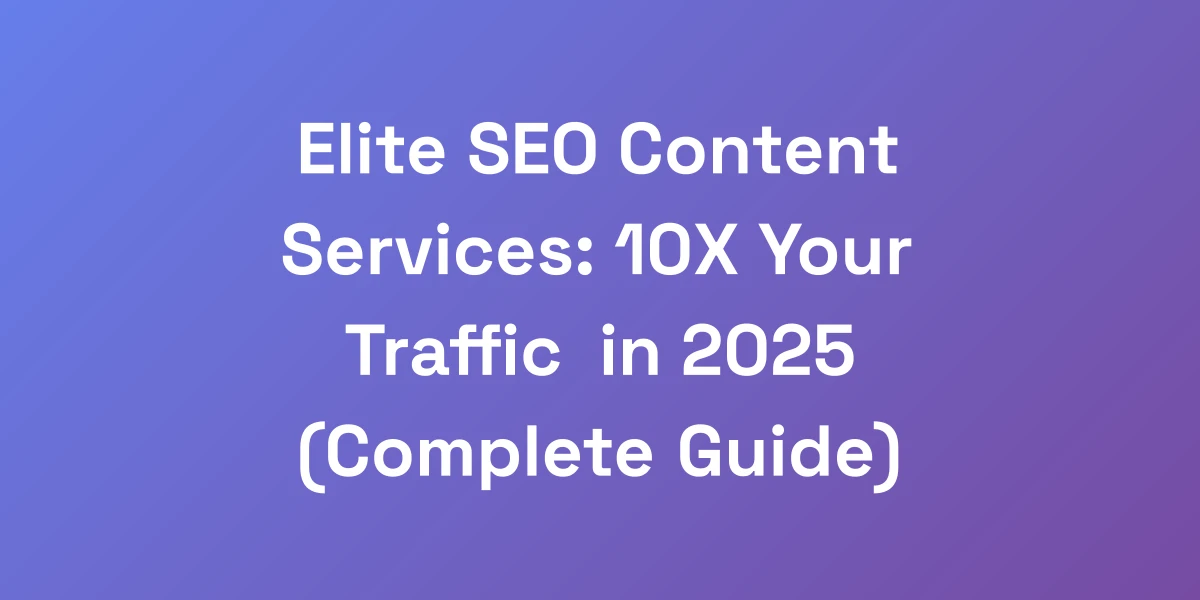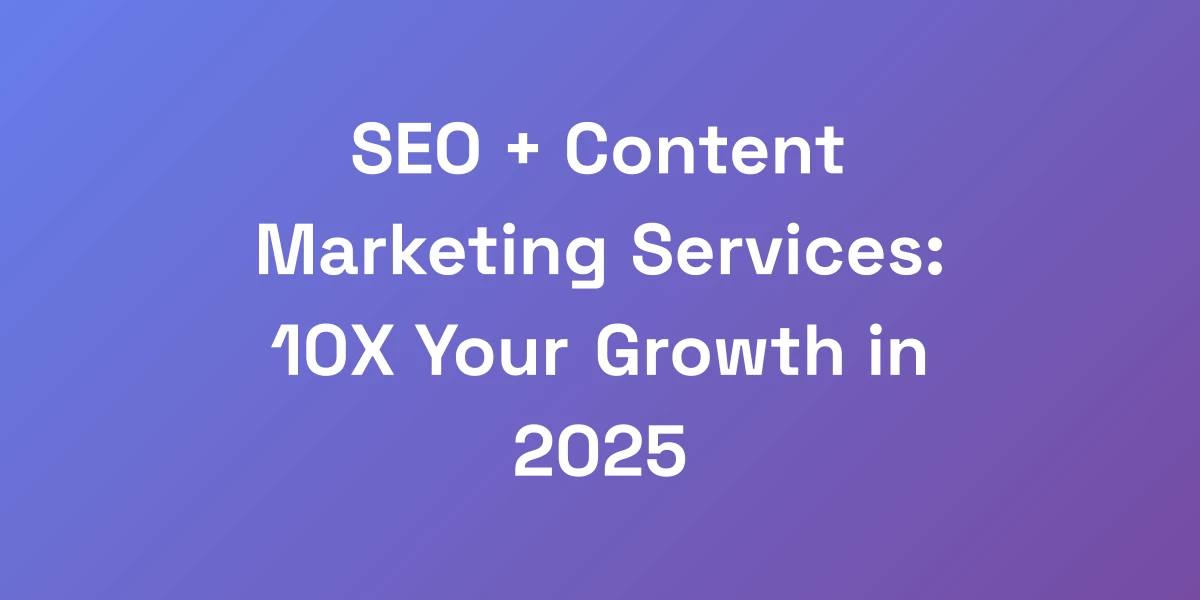
Elite B2B SEO Agency Guide: 10X Your Pipeline Growth in 2025
Mar 11, 2025 | By zishansami102@gmail.com
Why Traditional SEO Agencies Fail B2B Companies
Let us be direct: most SEO agencies B2B use are burning your money because they don’t understand B2B. We’ve seen countless companies waste 6-figures on agencies that deliver vanity metrics instead of revenue.
The truth? B2B requires a completely different playbook than B2C SEO. Your buyers aren’t making emotional purchases – they’re making calculated decisions with multiple stakeholders and longer sales cycles (average B2B deal cycle).
If your agency doesn’t understand this fundamental difference, you’re already losing.
The Costly Mistake of B2C Tactics in B2B Markets
So why do so many B2B companies fail with their SEO strategy? They apply B2C tactics to B2B markets. Simple mistake, massive costs. B2B is about relationship building, trust, and demonstrating value over time. B2C tactics focus on quick wins and high volume, which just doesn’t translate to the B2B landscape.
Imagine trying to sell a complex software solution with flashy ads and short-term promotions. Does that really resonate with a corporate buyer who’s mapping out long-term ROI?
- Consistency over flashiness.
- Depth over surface-level engagement.
- Educational content over promotional buzz.
By ignoring these nuances, traditional SEO agencies set B2B companies up for failure.
Understanding the B2B Buyer’s Journey Complexity
B2B buying journeys are intricate and layered. Unlike B2C, where decisions are swift and emotionally driven, B2B decisions involve multiple stakeholders and a series of evaluations. This complexity requires an SEO strategy that can nurture leads throughout the entire journey.
We deal with buyers who:
- Conduct extensive research before making a decision.
- Consult with various departments and influencers.
- Evaluate long-term benefits and ROI.
Your SEO strategy needs to align with these steps, providing valuable content at every stage to guide the decision-making process.
Why Traffic Metrics Are Misleading in B2B
Chasing traffic for B2B can be like chasing shadows. High traffic numbers might look impressive, but if those visitors aren’t converting into qualified leads, what’s the point?
B2B SEO should prioritize quality over quantity. We need to focus on attracting the right audience who have the intent and authority to make purchasing decisions, rather than just increasing visitor numbers.
- Targeted keywords that attract decision-makers.
- Content that addresses specific pain points and solutions.
- Optimizing for conversion through clear CTAs and lead magnets.
This approach ensures that the traffic you drive is more likely to convert into meaningful business opportunities.
According to B2B SEO statistics, focusing on lead quality significantly enhances your overall SEO effectiveness.
The Real Cost of Poor Lead Quality
Low-quality leads aren’t just a waste of time; they drain your resources and hinder your growth. When your SEO efforts attract the wrong audience, your sales team spends valuable time on leads that won’t convert.
Consider this:
- Higher bounce rates from irrelevant traffic.
- Decreased overall conversion rates.
- Increased customer acquisition costs.
By focusing on quality lead generation, you ensure that every lead has the potential to become a profitable customer, maximizing your ROI and supporting sustainable growth.
Case Study: Failed B2C Approach vs. Successful B2B Strategy
Let’s look at two hypothetical companies: AlphaTech and BetaSolutions.
AlphaTech used a traditional B2C SEO approach. They focused on high-traffic keywords and flashy content. While their site saw a spike in visitors, conversions lagged because their audience wasn’t the right fit.
BetaSolutions, on the other hand, adopted a B2B-centric SEO strategy. They targeted niche keywords relevant to their industry, created in-depth whitepapers, and developed a robust thought leadership presence. The result? Not only did their traffic quality improve, but their lead conversion rates soared, leading to a 10X increase in pipeline growth within a year.
This stark difference underscores the importance of a tailored SEO approach for B2B companies.
Core Components of Elite B2B SEO Agency Services
After analyzing over 100 successful B2B companies, supported by current SEO market statistics, we’ve identified the exact components that drive real results. Here’s what separates the top 1% of B2B SEO agencies from the rest: They focus on revenue-generating keywords instead of vanity search terms. They understand your entire sales ecosystem, not just your website. And most importantly, they build authority through strategic thought leadership, not just backlinks.
Let us break down exactly what you should demand from your agency.
Technical SEO Infrastructure for Enterprise Clients
Technical SEO is the backbone of any successful SEO strategy, especially for enterprise-level B2B companies. It ensures that your website is optimized for both search engines and users.
Key aspects include:
- Site Architecture: Logical structure that enhances crawlability.
- Mobile Optimization: Seamless experience across all devices.
- Page Speed: Fast loading times to reduce bounce rates.
- Secure Websites: HTTPS is a must for trust and rankings.
- Schema Markup: Enhances search engine understanding and rich snippets.
Elite agencies invest in tools for SEO and B2B marketing and continuously audit your site to fix any technical issues that could hinder your SEO performance. For insights into SEO automation in 2025, explore our comprehensive guide on AI-powered success.
Content Strategy Aligned with Sales Cycles
Content is king, but it’s not just about producing tons of content. It’s about creating content that aligns with your sales cycles and addresses the needs of your buyers at each stage.
Steps include:
- Keyword Research: Identify keywords that target different stages of the buyer journey.
- Content Mapping: Develop content that aligns with awareness, consideration, and decision stages.
- Value-Driven Content: Educational whitepapers, detailed case studies, and insightful blog posts that provide real value.
- Consistent Publishing: Regularly updated content keeps your audience engaged and coming back for more.
By tailoring content to your sales process, you ensure that your SEO efforts directly support your business goals. For a deeper dive into effective business blogging strategies, check out our ultimate guide to 6-figure growth in 2025.
Authority Building Through Thought Leadership
Building authority is about establishing your brand as a leader and trusted source in your industry. This goes beyond just backlinks; it’s about creating and promoting valuable insights and thought leadership.
Strategies include:
- Original Research: Publish studies and reports that showcase your expertise.
- Expert Contributions: Contribute articles to reputable industry publications.
- Speaking Engagements: Participate in webinars, podcasts, and conferences.
- Collaborative Content: Partner with other industry leaders to co-create valuable content.
When your audience recognizes you as a thought leader, your content naturally gains more traction and authority, enhancing your SEO performance.
Multi-Channel Integration Capabilities
SEO doesn’t exist in a vacuum. An elite B2B SEO agency integrates your SEO efforts with other marketing channels to create a cohesive strategy.
Key integrations include:
- Social Media: Amplify your content and engage with your audience on social platforms.
- Email Marketing: Use SEO insights to enhance your email campaigns and nurture leads.
- PPC Campaigns: Complement SEO with paid search for a balanced approach.
- CRM Systems: Sync SEO data with your CRM to better track and manage leads.
This multi-channel approach ensures that your SEO strategy supports and enhances all aspects of your marketing efforts, driving better overall results.
Performance Tracking Beyond Rankings
Focusing solely on rankings is a mistake. Elite agencies track a wide range of top metrics for evaluating B2B agencies to gauge the true effectiveness of your SEO strategy.
Key metrics include:
- Organic Traffic: Monitor the quality and quantity of visitors coming from search engines.
- Conversion Rates: Track how well your SEO efforts are converting visitors into leads.
- Lead Quality: Measure the quality of leads generated through SEO.
- Engagement Metrics: Analyze time on site, bounce rates, and other indicators of user engagement.
- Revenue Attribution: Connect SEO efforts directly to revenue generated.
By looking beyond rankings, you get a comprehensive view of your SEO performance and can make informed decisions to optimize your strategy further.
The ROI Framework for B2B SEO Investment
Stop thinking about SEO as a cost center. When done right, it’s your most profitable customer acquisition channel. Here’s the math: If your average customer lifetime value is $100,000, and your SEO agency helps you acquire just 5 new customers per month, that’s $6M in annual revenue.
But here’s the critical factor most miss: The compounding effect of authority building means your cost per acquisition actually decreases over time, unlike paid channels.
Calculating True Customer Acquisition Costs
Understanding your true customer acquisition cost (CAC) is essential for evaluating the effectiveness of your SEO investment.
Here’s how:
- Total SEO Investment: Include all costs related to SEO efforts, such as enterprise SEO pricing.
- Total Customers Acquired: Over a specific period, calculate how many customers were gained through SEO.
- Calculate CAC: Divide the total SEO investment by the number of customers acquired.
This calculation helps you see the real cost to acquire each customer and assess whether your SEO strategies are cost-effective.
Timeline to Positive ROI in B2B SEO
SEO is a long-term investment. Unlike paid advertising, the benefits accumulate over time. Typically, you can expect:
- Initial Setup and Optimization: 1-3 months.
- Content Generation and Authority Building: 3-6 months.
- Achieving Positive ROI: Typically within 6-12 months.
Patience is key. The longer you invest in SEO, the more your authority and rankings grow, leading to sustained and increasing ROI.
Measuring Quality Lead Generation
Not all leads are created equal. Measuring lead quality ensures that your SEO efforts attract high-potential prospects.
Consider these factors:
- Lead Scoring: Rank leads based on their likelihood to convert.
- Intent Signals: Look for behaviors that indicate purchase intent, such as downloading whitepapers or requesting demos.
- Engagement Levels: Assess how engaged a lead is with your content and offerings.
By focusing on quality, you ensure that your sales team is working with leads that have a higher chance of converting into valuable customers.
Long-term Value vs. Short-term Gains
SEO’s real power lies in its ability to generate long-term value. Unlike short-term paid campaigns, SEO continues to drive traffic and leads long after the initial investment.
Here’s why:
- Evergreen Content: High-quality content remains relevant and continues to attract traffic over time.
- Sustainable Rankings: Strong SEO practices result in stable, high rankings that aren’t easily lost.
- Trust and Authority: Ongoing SEO efforts build trust and authority, which keep customers coming back.
This long-term focus ensures that your SEO investment delivers continuous returns, making it a cornerstone of your customer acquisition strategy.
Risk Mitigation Strategies
Like any investment, SEO comes with its risks. However, elite agencies use strategies to mitigate these risks and ensure steady progress.
Key strategies include:
- Diversified Keyword Strategy: Avoid over-reliance on a single keyword or niche.
- Regular Audits: Continuously monitor and adjust strategies based on performance data.
- Adherence to Best Practices: Follow search engine guidelines to prevent penalties.
- Flexible Planning: Adapt strategies to changing market conditions and algorithm updates.
By implementing these risk mitigation strategies, your SEO investment remains secure and adaptable to any changes in the digital landscape.
How to Evaluate and Select a B2B SEO Agency
We’re about to give you the exact framework we use to evaluate agencies. First, ignore their case studies – most are cherry-picked. Instead, look for these non-negotiable indicators: Their own organic visibility in B2B terms, their content quality (not quantity), and their understanding of your specific industry’s sales cycle. Referencing the top B2B SEO agencies in the US can provide benchmarks for evaluating potential partners.
Here’s the truth: A great B2B SEO agency should be able to explain your customers better than you can.
Critical Questions to Ask During Evaluation
When vetting potential agencies, ask questions that reveal their true capabilities:
- How do you tailor your SEO strategy to B2B companies?
- Can you provide examples of how you’ve improved lead quality for your clients?
- What tools and methodologies do you use for your SEO campaigns?
- How do you align your SEO efforts with our sales cycles?
- What metrics do you prioritize, and why?
These questions help you gauge the agency’s expertise and their fit with your business needs. For startups looking to scale, understanding specialized strategies like those outlined in our SEO for Startups Playbook can be invaluable.
Red Flags to Watch For
Not all agencies are built equal. Watch out for these red flags that indicate a potential poor fit:
- Guaranteed Rankings: If an agency promises specific rankings, consider it a red flag.
- One-Size-Fits-All Approach: Agencies that use the same strategy for every client lack customization.
- Opaque Reporting: If they’re not clear about their processes and results, it’s a warning sign.
- Poor Communication: Regular and transparent communication is crucial for a successful partnership.
Recognizing these red flags early can save you from potential SEO fiascos.
Pricing Models and What They Reveal
Understanding an agency’s pricing model can provide insights into their approach and priorities.
Common pricing models include:
- Hourly Rate: Good for short-term projects or audits.
- Project-Based: Suitable for specific, one-time initiatives.
- Monthly Retainer: Ideal for ongoing SEO efforts and long-term strategies.
Each model has its pros and cons, but elite agencies typically prefer retainers, indicating their commitment to sustained growth and long-term partnerships. For freelancers looking to enter the SEO space, our Ultimate SEO Freelancer’s Blueprint offers detailed guidance.
Contract Terms and Expectations
Clear contract terms are essential for a successful SEO partnership. Here’s what to look for:
- Defined Objectives: Clear goals and KPIs that align with your business objectives.
- Detailed Deliverables: Specific tasks and responsibilities outlined in the contract.
- Flexibility: Ability to adapt the contract as your needs evolve.
- Performance Clauses: Incentives for achieving targets and penalties for underperformance.
Transparent contract terms ensure that both parties are aligned and accountable for the SEO outcomes.
Team Structure and Expertise Requirements
The team behind your SEO campaign is just as important as the strategy itself. Ensure the agency has:
- Specialized Roles: Dedicated experts for content, technical SEO, link building, and analytics.
- Industry Knowledge: Experience in your specific B2B sector to understand its unique challenges and opportunities.
- Proven Track Record: Demonstrable success in driving growth for other B2B companies.
Having a skilled team is vital when how to start an SEO business involves various specialized roles and expertise.
Implementing a Successful B2B SEO Partnership
The difference between success and failure often comes down to the first 90 days. Most companies mess this up because they don’t set the right foundations. You need a clear implementation roadmap that aligns SEO with your sales process. This isn’t just about keywords and content – it’s about creating a systematic approach to dominating your market.
Let us guide you on structuring your first quarter for maximum impact.
First 90 Days Implementation Plan
The initial phase sets the tone for your entire SEO strategy. Here’s how to structure it:
- Audit and Analysis: Comprehensive review of your current SEO status, including technical, content, and backlink profiles.
- Strategy Development: Craft a detailed SEO strategy tailored to your business goals and sales cycle.
- Quick Wins: Identify and implement immediate improvements that can boost your SEO quickly.
- Content Plan: Develop a content calendar aligned with your sales stages and buyer personas.
- Initial Optimization: Begin optimizing on-page elements such as titles, meta descriptions, and internal linking.
This focused approach ensures that your SEO efforts are aligned and moving in the right direction from day one.
Internal Team Alignment Strategies
Success in SEO requires seamless collaboration between your internal teams and the agency. Here’s how to achieve it:
- Regular Meetings: Schedule weekly or bi-weekly check-ins to discuss progress and address any issues.
- Clear Communication Channels: Use tools like Slack or Asana to keep everyone on the same page.
- Shared Goals: Ensure that both your internal team and the agency are working towards the same objectives.
- Feedback Loops: Establish mechanisms for continuous feedback and improvement.
By fostering strong internal alignment, you create a collaborative environment that maximizes your SEO efforts.
Content Development Workflow
Developing high-quality content is a cornerstone of B2B SEO. Here’s a streamlined workflow to ensure consistency and quality:
- Ideation: Brainstorm topics based on keyword research and buyer personas.
- Creation: Assign content to experienced writers who understand your industry.
- Review: Implement a rigorous editing and approval process to maintain quality.
- Optimization: Ensure content is SEO-friendly with appropriate keywords, headings, and internal links.
- Publishing: Schedule and publish content according to your content calendar.
- Promotion: Share content across relevant channels to maximize reach and engagement.
A well-defined content workflow ensures that your content strategy is executed efficiently and effectively.
KPI Setting and Monitoring
Setting the right Key Performance Indicators (KPIs) is crucial for measuring your SEO success. Here’s how to define and monitor them:
- Identify Relevant KPIs: Focus on metrics that align with your business goals, such as organic traffic, lead quality, and conversion rates.
- Set Realistic Targets: Establish achievable goals based on industry benchmarks and your current performance.
- Regular Monitoring: Use tools like Google Analytics and SEMrush to track your KPIs continuously.
- Adjust Strategies: Based on KPI performance, tweak your SEO strategies to address any shortcomings.
By keeping a close eye on your KPIs, you can ensure that your SEO efforts are on track and delivering the desired results.
Scaling Success Metrics
Once you’ve established a solid foundation, it’s time to scale your SEO efforts. Here’s how to effectively scale:
- Expand Keyword Targets: Identify new keywords to target as your site gains authority.
- Increase Content Production: Develop more content to cover additional topics and attract a broader audience.
- Enhance Technical SEO: Continuously improve site speed, mobile optimization, and other technical aspects.
- Broaden Outreach: Engage in more extensive link-building and thought leadership initiatives.
- Automate Processes: Use SEO tools to automate repetitive tasks and focus on strategic activities.
Scaling your SEO strategy ensures continuous growth and helps you maintain your competitive edge in the B2B market.
Conclusion
We’ve walked you through why traditional SEO agencies often fall short for B2B companies and highlighted the core components that define elite B2B SEO agency services. From understanding the complex B2B buyer’s journey to implementing a robust ROI framework, the right SEO strategy can transform your pipeline growth.
Remember, SEO is not just about rankings; it’s about generating high-quality leads, building authority, and driving long-term growth. Investing in the right seo agency b2b can be your most profitable decision in 2025.
Ready to 10X your pipeline growth? Reach out to a specialized B2B SEO agency today and start your journey towards unparalleled success.
What challenges have you faced with traditional SEO agencies? Share your experiences in the comments below and let’s discuss how to overcome them together.








